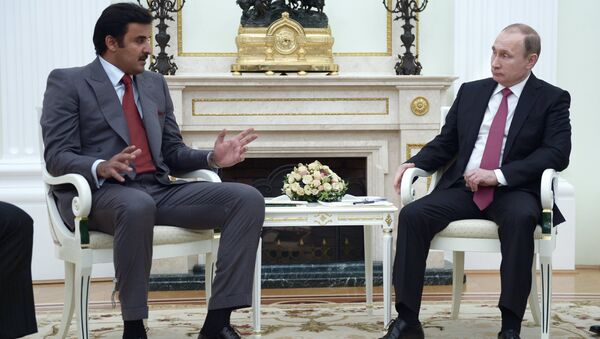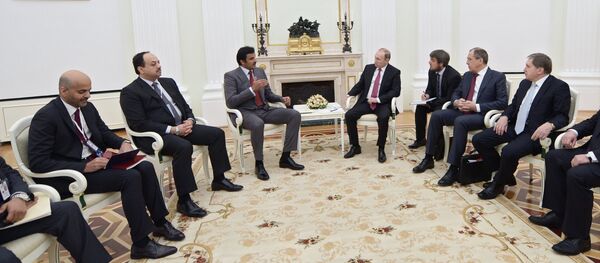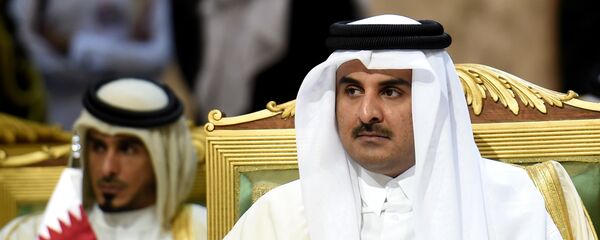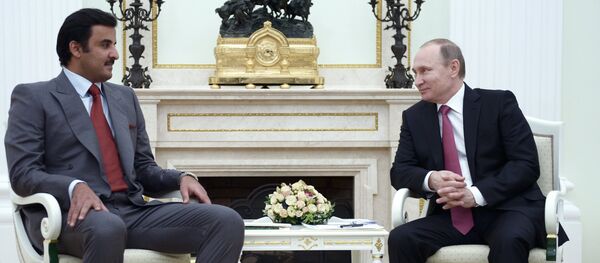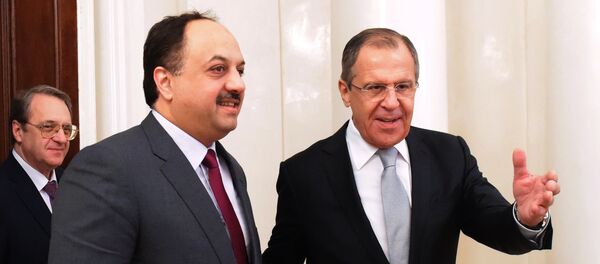For his part, Gevorg Mirzayan, special correspondent for the respected Russian business magazine Expert, suggested that what the Qatari emir may be after is a diplomatic solution which would offer his country something akin to peace with honor in Syria – in other words, an honorable surrender.
"At first glance, of course," Mirzayan writes, "there wasn't any talk of a capitulation. The two sides exchanged their positions, complemented one another, and talked about the Middle East. In the Middle Eastern tradition, the emir did not pass up a [chance to offer a] regal criticism of Israel, and asked Russia for help in ending the blockade of the Gaza Strip. However, it's obvious that the main theme of the talks was the Syrian conflict."
"However, in Moscow, the emir expressed a different opinion."
"We are counting on our friends in Russia to play a large role in resolving the catastrophic situation which has befallen the Syrian people, with this tragedy, and to reach a political settlement," Tamim noted, during his meeting with Russian lower house speaker Sergei Naryshkin on Monday.
For his part, Mirzayan believes that "such a sharp change in rhetoric" is not mere diplomatic courtesy: "The emir is simply adapting, and it's no secret that Qatar is now in a very difficult situation."
This, the journalist notes, is the result of Qatar's regional conflict with Saudi Arabia. "After former emir [Hamad bin Khalifa al-Thani's] plans to seize the leadership of the Middle East collapsed [in 2013], he was forced to resign, and it fell upon his son, Tamim, to improve relations with Doha's neighbors, who had long sought to put the emirate in its place."
The new government's "plans did not succeed. Less than 10 days after Tamim's accession to the throne, the Egyptian military, in an unholy alliance with the Saudi monarchy, toppled the Muslim Brotherhood regime in Egypt, in whom the Qataris had invested a great deal of effort and resources. The new emir found himself isolated, and was forced to maneuver desperately to salvage the emirate's influence in the Middle East. Saudi Arabia and its allies presented Doha with an ultimatum looking to deny Qatar any influence in the region."
"Factually, Doha went all in on Syria, even to the point of spoiling relations with the West (Washington and Brussels are well aware of who provides support for Daesh). For a time, it appeared that the gamble was working – Daesh successfully attacked government troops, expanding their zone of control even in Latakia, the stronghold of Syrian President Bashar Assad. Then, suddenly, Russia joined the war, and the balance of power in the region changed dramatically."
Subsequently, according to Mirzayan, Tamim's visit to Moscow is connected to a search for options on how Qatar might extricate itself from the Syrian conflict.
In any case, "it cannot be excluded that the emir's apparent willingness to take a constructive stance on Syria has one long-term goal: to achieve a rapprochement with Iran. After all, following a normalization of relations with Iran, Qatar would be able to cool the Saudis' ardor, and get them to stop the dangerous pressure on Qatar which threatens to push the emirate to the 'other side'."
"Of course," Mirzayan says, "this does not mean that the emir's visit to Moscow resulted in some agreement. But the very fact that Qatar has begun a dialogue on changing its position serves as an important signal to all participants of this 'game', which covers not just Syria, but the Middle East as a whole."

